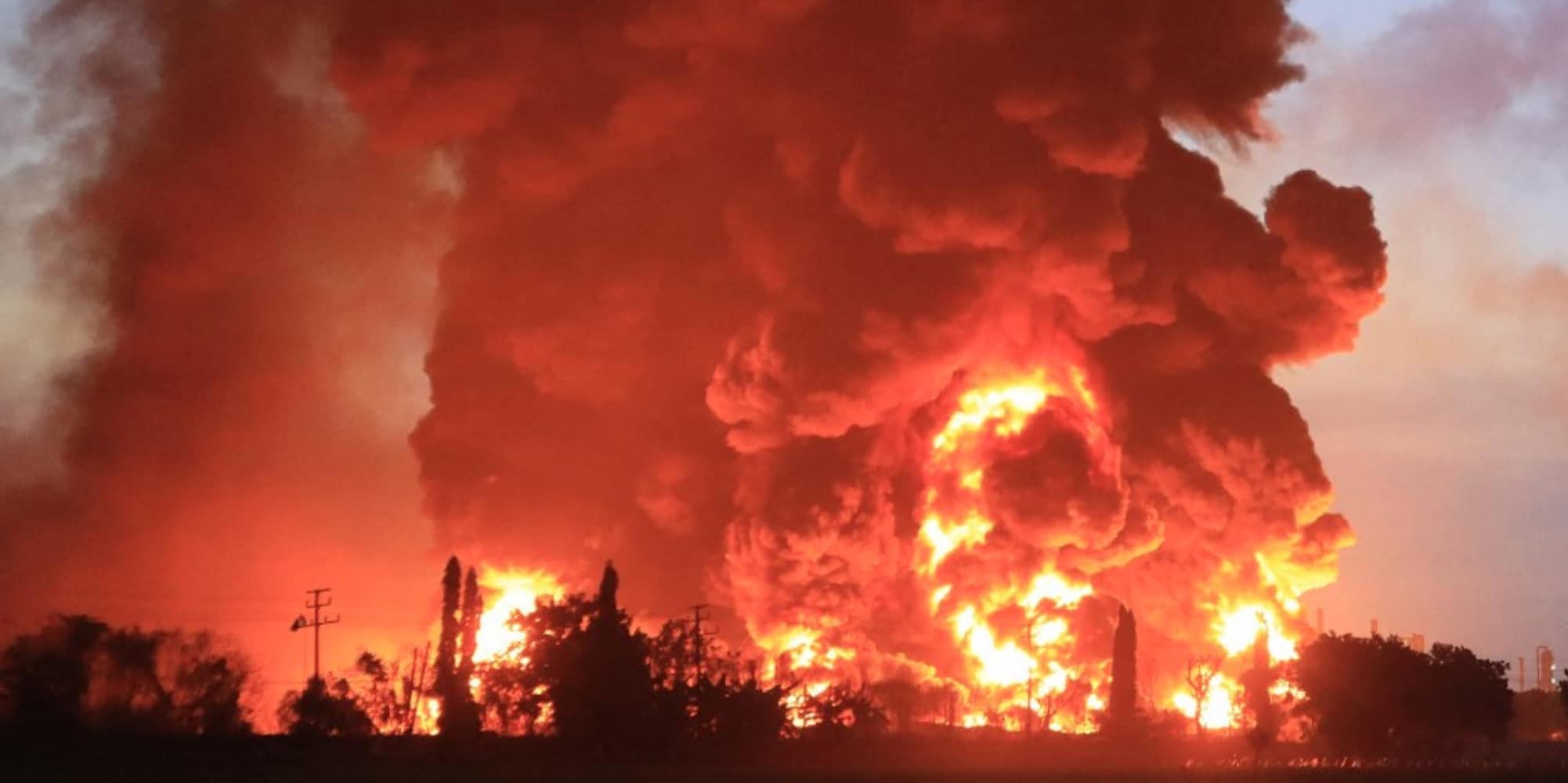JAKARTA, INDONESIA — Fire and thick smoke were seen again on 2 Apr from one of the fire-struck tanks at the Balongan Refinery, Indramayu, West Java — one of the oil refinery operated by state oil giant Pertamina.
Previously on 29 March, the blaze broke out in four out of 72 tanks at the Balongan refinery — the main fuel suppliers for Jakarta, Banten, and West Java.
The incident at the Balongan refinery injured 21 and forced over 900 residents to evacuate, as Reuters reported.
One person died instantly from a heart attack after the blast, the local disaster mitigation agency stated.
How many barrels has Pertamina lost?
The Institute for Development of Economics and Finance (INDEF) estimated that Pertamina incurred a Rp 112 billion loss, based on a rough assumption.
This means that if the company’s production cost is worth USD 20 per barrel and it lost 400,000 barrels, then the estimated casualty would cost USD 8 million or Rp 112 billion.
However, Bisman Bakhtiar from The Center for Energy and Mining Law Studies estimated that the potential loss could be more than the estimated figure.
“It can be more than 400,000 barrels. Let’s say Pertamina lost 400,000 barrels due to the blaze. Imagine that the oil price stands at USD 70 per barrel. It can be half a trillion in Indonesian Rupiah.
“Do not forget about the cost of infrastructure damaged by the fire. And, if the refinery temporarily halts the operation, of course, you can imagine how many barrels it will lose a day. Also, the compensation paid to affected residents,” Bisman told TOC.
The incident also hampered the shipment of PT Pertamina Hulu Energi Offshore North West Java for a week, The Upstream Oil and Gas Regulatory Special Task Force (SKK Migas) stated in a statement.
It is not the first fire-related incident
The oil and gas industry is one of the sectors with the strictest safety procedures. Therefore, any unpredictable and unwanted occurrences should be anticipated in advance.
A similar incident struck the Balongan Refinery in 2007 and 2019. However, the fire on 29 March was the worst fatality.
Head of Lightning Research Center, Prof Reynaldo Zoro, as cited in Antaranews, claimed that lightning strike caused the fire, as tropical lightning is more powerful than subtropical ones.
However, the Meteorology, Climatology and Geophysics Agency claimed that the blaze that damaged the tanks at the refinery had nothing to do with lightning strikes.
“The lightning rod may have stopped working. However, the rod prevents the fire, as the risk assessment stated. If the rod had stopped working but everyone there complied with the procedure, the mitigation would not take that long,” Ucok Sigalingging, a Pertamina consultant who has 30 years experience in the oil and gas sector, told TOC on 30 Mar.
The energy ministry said that investigations are ongoing to find out the cause of the blaze.
Ucok—who once worked for multinational oil giant Chevron—added that Pertamina’s total oil production contributes only 20 per cent to domestic fuel needs, while the main contributor is foreign-operated K3S (industry contractors).
“Such an incident also happens to other oil and gas companies. However, people pay attention to Pertamina as it is a state-owned enterprise,” Ucok stated.
The incident and the need for strategic reserve
Pertamina’s Logistics and Infrastructure Director Mulyanto, as cited in Tempo, assured that the fire did not affect the national fuel supply as gasoline is sufficient for the next 27-28 days, aviation turbine fuel for the next 74 days, and solar for the next 20 days.
The Balongan refinery—set up in 1994—is one of the most vital oil facilities as it processes Duri and Minas crude oil from Riau Province.
The recovery of the refinery’s functions is urgent to ensure that fuel supply can fulfil Indonesia’s national needs. If the refinery does not recover, the fuel supply will recede.
“Indonesia does not have strategic reserves stored in piled tanks. Most of the reserves are commercial reserves stored in Pertamina’s refinery’s tanks, like in Balongan.
“Let’s say four tanks have been damaged and each tank stores around 200,000 barrels. So where are those 800,000 barrels going?” Bisman stated, adding that Pertamina’s tanks are designed to store commercial reserve.
The strategic reserve is crucial for an unexpected event such as wars or disaster, fire. If the supply only lasts for less than 20 days, such a situation is a warning sign to a country’s energy security.
Indonesia once was one of the world’s biggest oil producers with an output of around one million barrels a day in the 1990s. However, Indonesia has been a net oil importer since 2010, as the output can’t fulfil national fuel consumption.
The increase in refinery’s capacity plays a role in reducing oil import
The Balongan refinery is relatively new compared to other refineries, which were built in the 1970s and 1980s.
Pertamina is now planning to build new refineries and increasing refineries’ capacity aimed at reducing oil import.
“The solution is to export crude oil. However, on the other side, we import fuel. The technical reason is not all domestic refineries can process all types of crude oil. The other reason is the oil mafia who benefits from import,” Bisma and Ucok explained why Indonesia is now a net oil importer.
Refineries with the latest technology provide more efficiency in processing crude oil than the old facilities, Bisman added.
Ucok suggested that Pertamina can focus on increasing the capacity of the existing refineries instead of the quantity.
“If the capacity is increased, we can reduce oil import,” he said, wrapping up the interview.






